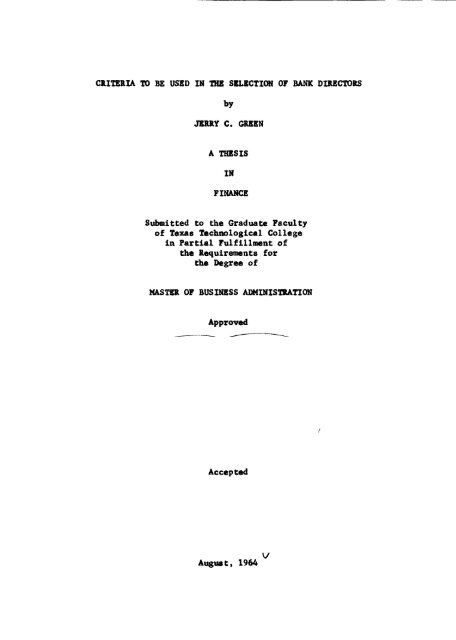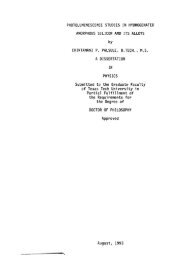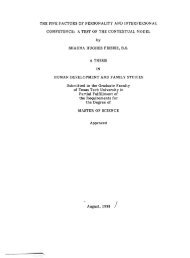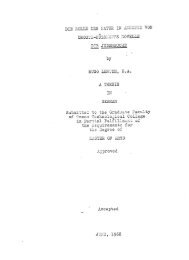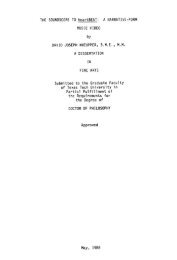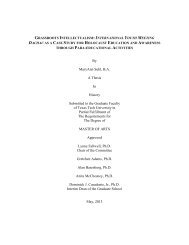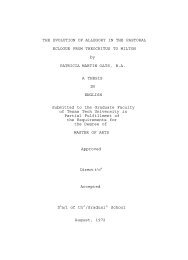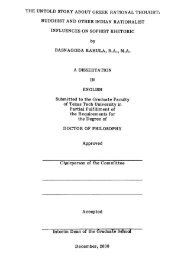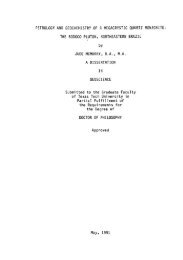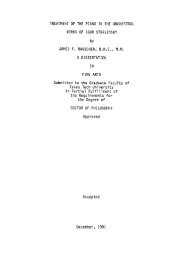CRITERIA TO BE USED IN THE SELECTION OF BANK ...
CRITERIA TO BE USED IN THE SELECTION OF BANK ...
CRITERIA TO BE USED IN THE SELECTION OF BANK ...
Create successful ePaper yourself
Turn your PDF publications into a flip-book with our unique Google optimized e-Paper software.
<strong>CRITERIA</strong> <strong>TO</strong> <strong>BE</strong> <strong>USED</strong> <strong>IN</strong> <strong>THE</strong> <strong>SELECTION</strong> <strong>OF</strong> <strong>BANK</strong> DIREC<strong>TO</strong>RS<br />
by<br />
JERRY C. GREEN<br />
A <strong>THE</strong>SIS<br />
<strong>IN</strong><br />
F<strong>IN</strong>ANCE<br />
Subnitted to the Graduate Faculty<br />
of Texas Technological College<br />
In Partial FulfllXinent of<br />
the Requirements for<br />
the Degree of<br />
MASTER <strong>OF</strong> BUS<strong>IN</strong>ESS ADM<strong>IN</strong>ISTRATION<br />
Approved<br />
Accepted<br />
August, 1964<br />
V/
i\t<br />
1004-<br />
ACXHOHLIDONEinS<br />
Appraetatton la g;ratafobarc L. louaa<br />
and fiaorga H. Barry for thalr aaalatanca la tha praparatlon of thla<br />
tbaaia.<br />
U
tABLI OP CCMXIKT8<br />
Fege<br />
AaaKMLEDOMBNTS ii<br />
TABLE OP COMlBNtS ill<br />
X. PBBPACB 1<br />
Ila A USOi DIBB€t0t*8 J0B 6<br />
IXX. OGKPOSXtXCHI Of HE BQABS 31<br />
XV. sracxAL momjom am Di<strong>BE</strong>Ctois 37<br />
p. CRIUBIA to n <strong>USED</strong> m vm SBuctxoi m A <strong>BANK</strong><br />
DZBBCT^ 45<br />
?X. 001^3.08X011 52<br />
BXBLiocatAHnr 53<br />
iii
FBBPACB<br />
OyasBie leedership of the private eatarprise systea is<br />
a^aaai^aanp'w iitait Mkawapep ^w^anv Mive^HeB^r aw^^apwaPia^w^a j^aa ^^ ey^fcT^awiep ^^at^B» ap^i^ e^^^ ^^^i^e^ "^^ww© ^^^^a*s^^>ew ^ei^Heeevaei^HvMkee4aMet^st ^i^e^Hn ^^^fc^Mwi^*e*ep<br />
rata of growth and ia furthering progress* must cone to the reeliaa-<br />
tioa that they have failed to i^eqaately nwet the needs for dynaaie<br />
leadership* this leek of dyaenissi enKKig the beaking leaders of the<br />
reeent pest end the preseat* has resalted in pertiel stegnstion of<br />
beaking.<br />
the parpose of this thesis is to esteblish that bank leader*<br />
ship ia the laited $tetes end ia tiiis regioa has not been edeqaete.<br />
Xf erifeerie for use in eelaeting beidt laaderehip can be esteblishad<br />
ead followed, the result would be e trend awey froei pertiel steg«<br />
nation toward dyneaii«a vithia the beidtiflg business •<br />
the esteblishBwnt of eriterie for use in eelaeting leeders<br />
has long been one of manU nost perplexing probleas. the problea<br />
cannot be solved by ignoring its eidlstenee* the ettenpt to speeifi-<br />
eally nsne tiiese criteria is progress ia itself, these eriterie,<br />
of necessity, oast be breed to ellow for flexibility of use* the<br />
aore dyaaaie the prevailing eoaditions, the nore laiportent it beeootts<br />
to eeleet e leeder eapeble of aeeting tha ehallengee lAtich constantly
arise. Baskere have felled to esteblish such eriterie with the<br />
result thet week leederehip hes becesMi characteristic of beak boards<br />
of diraetore.<br />
Bafinition of terns<br />
Ssneaties hes loag posed e problsn ia the coaBunication of<br />
idees between nen. therefore, for elerity, the following definitions<br />
of key words will apply throa^umt the text.<br />
1. Oyaaaic - farteiaiag to ehaage ox proeess (regerded as<br />
aenifestetion of energy)<br />
2. Leederehip • Colleetiva piidenee or eonduetion; hence, to<br />
direct in actioa, thoai^t, opiaioa<br />
3. foiterie • Stenderds of Judgaeat, rules or priaeiples for<br />
teetiag or aeesttriog<br />
4. Paaetioa •* A speeiel duty or perforBsaee required of e<br />
person ia the course of work or ectivity<br />
5. Buty - Morel or legel oblige tioa to action required by<br />
one's position or oeeupetion<br />
6. Obligetien « A binding reqaireaent es to eetion<br />
7 a Baepoasibility *• Aet of being answerable or eeeoanteble<br />
for sosiething within one*s power<br />
8. Msnegsnent *' Golleetive body idio execute policy<br />
9. Bireetors - Colleetive body who direct by policy oeking<br />
10. Peliey *» A settled coinrse edopted end followed by e govern*<br />
wmtLtt institution, body, or individuel<br />
11. Inside Bireetors * A director heving COOM up tiiroa^ the<br />
beide end thus identified wich its aensgsaent<br />
12 a Outside Bireetor * A director who has been uneonnscted<br />
vil^ the business end tiius hes no opereting feailierity<br />
witiii it<br />
Burvay of Subject I^il^ereture<br />
There deists little Iitoretare eoaeeraiag bank directors•<br />
The sttbjeet BK>st freqaently covered is directors, referring to<br />
aenafaeturing end/or Industriel directors, therefore, e conversion<br />
of idees, eoneemed with directors et lerge, wes necessery to fit<br />
the inforaetion evaileble to the purpoee of the thesis. This
eoadltien results In essus^tioas beiag aede which are besed on value<br />
Meay of the ideas and suggestions cotae fron writings accepted<br />
by the Anarieen Meaegaaeat Assoeietioa. Bafortaaetely, there is<br />
a noticeeble leek, ia eay of these writiags, of probleas peculiar<br />
to beak directors. Ferhaps this ladicetes a laxity oo the pert of<br />
benkers to ettsnpt to fally uaderstend their positiea.<br />
there is aveileble a listiag of the legel responsibilities<br />
of bank directors published ia the state beaking codes by the Coap-<br />
troller of the Currency. But legel duties snd responsibilities do<br />
not eabreee the eeapleteaess necessery for full uoderstending.<br />
Orgenisatioa<br />
By essiad.ag that a goal of beaking is nore proficient aenage-<br />
flteat, one then can look et the means available of echieving this<br />
goel. The conflict between means end ends, if such a conflict exists<br />
in the ainds of retional nen, poses oAay probleas. Perhaps Kenneth<br />
Boulding sumarises most edequetely these probleas in one of his<br />
poeas, which followss<br />
Huaaa nature elways teads<br />
To worship Ifsens ins teed of Ends,<br />
And so we often aiss the bus<br />
By lingering in the Terainus:<br />
And yet he loses ell his friends<br />
Whose Meens he justifies by Ends,<br />
Because it cannot be denied,<br />
There's much enjoyaent in the ride.^<br />
Xa the dey*»to*day pedeatries of life, men have e tendency to accept<br />
^Kenneth B. Boulding, Principles of Economic Policy (Bnglewood<br />
Cliffs, B. J.: Prentiee*lell, Inca, 1958), p. 131.
what is, assuming that die goal will be echieved. But if the end<br />
is worth eehieving, we cannot forget diet the meens of eecoo^lish*<br />
meat mey heve to be chengad to meet changing conditions. Time weits<br />
on no men, bat neither should men weit on time. If the betterment<br />
of beidtiag is a wortimhile gsal, it becomes e necessity to choose<br />
ead select directors by e proeess worthy of that goal.<br />
Tekieg a hypothetieel situetion wherein the diieirmen of the<br />
boerd of directors of eny benk suddenly dies, tbe lanediete task<br />
is to fiad the best possible replaeemwit. Xn the selection of this<br />
n^leeement, it would be desireble to know es much es possible about<br />
the Job. Seme of the meay tesks which the director will be cmicemed<br />
with ere suggested by die Amerieen Basdcers Assoeietioa. these ere:<br />
1. Legal responsibility<br />
2. Cere ead diligence<br />
3. Oversell policy<br />
4. Lending peliey<br />
5. £svestment peliey<br />
6. Trust deportment<br />
7. Coaswier ead mortgage credit<br />
8. Personnel<br />
9. Bamings, expenses, end dividends<br />
10. Internal eontrols<br />
11. Mow customers<br />
12. Bireetor's exeminetien<br />
13. Let aenegement menage<br />
14. director's retireneat<br />
15. Aree developamiat<br />
16. Msrgers<br />
17. Breach esteblisbment<br />
18. Pension fund^<br />
After the cimsideretion of the Job itself, the question<br />
^Herbert Bretter, "A Benk director's Job," Banking. The<br />
Journel of the American Bertkers Association. 1963, p. 4.
arises, should each task be looked et ia the S«M light by inside<br />
end outside directors? this is e study of the eea^sitioa of the<br />
boerd.<br />
Atteation is thea givaa to the problem of our duel charter*<br />
iag system. Should the eriterie of seleetioa be the same for<br />
directors of stete chartered beaks end directors of aetioaelly<br />
ehartered beaks? Gea the essuB^tioa be mede that ell directors,<br />
beeeuse their Job is similar, be ehosea oa the basis of the ssae<br />
criteria?<br />
Another eonsideretioa to be viewed eoaceras the selection<br />
of directors for the various sise benks. Ageia, is it reeaonable<br />
to essuBs thet a director in e small rural beak should be chosen<br />
ia e manner slmller to the selection of e large urben benk director?<br />
there exist meny miseoaeeptions about the role end perform*<br />
ance of bank directors, the man to be selected es the hypothetieel<br />
repleeemeat should be eware of these miseoaeeptioas ead therefore<br />
know in whet meaner to hendle then es they erise.<br />
Prom die foregoing ehi^ters, an ettss^^t will be mede in the<br />
finel ehepter to esteblish eriterie useful in die selection of e<br />
benk director. Xt will beecsMi epperent thet the leek of eriterie<br />
is unfortunete. Furthermore, if end when some criteria ere used,<br />
beaking mey be eble to stride forwsrd with e piarpose, e goel, end<br />
jast es important, the meens of etteinaent.
A BABK BIBSCtOt'S JOB<br />
the aeseatiel beaking problem ie to reeolva the coafliet<br />
betwaea safety end prefitebility in the employment of beak<br />
suaas.<br />
More than any other fineneiel institatiea, they heva e<br />
vaetly eeberiag and aaaetiag raepoasibili^: they must be<br />
reedy to 'pay oa demend' without waraiag or aotiee* e good<br />
shore of their liebUitiae.^<br />
The ert of directing is not sows thing to be leemed over*<br />
nig^t. Xt tekes time ead work* Xt is e Job wherein one x»ver has<br />
et hie eonaaad eneagli kaewledge ead iaforaetien.<br />
To be ^ioeen to serve ee e benk director is en honor in one's<br />
eemauaity; butt more than that* it is a raspeasibili^. there<br />
is first of all the moral responsibility e beak director essumes<br />
toward his fallow shareholders» die dapeeiters* ead the generel<br />
public ito ere effected 1^ the benk's soundaees.2<br />
Baletad closely id.th tha morel responsibility of e benk direetor is<br />
his social raspeasibility. Hie feet thet a beak ie both e profit<br />
seeking business end e sarviM institution askes it strongly tied<br />
to tha soeial welfare.<br />
the aaeessity that a baide direetor reeegnise his morel ead<br />
soeial responsibilities iapeead en him by state and Federel aathori*<br />
tiee is B9ma ia dM strict legal obligatieae feead daily by the<br />
Tork: MeCraw^Hill Book Company, Xne** 1962)» p. 11.<br />
hkfmttm, satL,M&*» P* 5.<br />
•>«Hrv<br />
6
director, these authorities are responsible for the legel conduct<br />
of banking. For exsmple, the Goi^itroller of the Curreacy hes pi^<br />
lUhed a booklet ebout diirty peges ia leagth deeliag solely with<br />
the duties and liebilities of directors of aetioaelly chertered<br />
beaks. Oa perusel, oae een immediately note thet beak directors<br />
ere held to stricter eeeouatebility for both their eetions end their<br />
ineetioas than ere directors of corporetions generelly.<br />
The iaportent position eeeupied by the besk director is reveeled<br />
by the fact that the vest majority of letters, criticel or other*<br />
wise, seat to benks by the toq^troller*s office ere eddressed to<br />
the boerds of directors of beaks they are examining to take up<br />
matters of importenee.^<br />
ScBM of the most isq^ortaat legel respoasibilities of directors ere:<br />
la the beak must be meaned by ccmpeteat executive officers a<br />
2 a The directors must effectively superviee ead control the<br />
heir's effeirs.<br />
3. Sound policies mist be maintained.<br />
4. The directors may never employ self*serving prectiees.<br />
5. they must keep informed of the beide's condition and peliciee.<br />
the Supreme Court has been cereful not to define precisely the degree<br />
of cere end prudenee to be expected of benk directors. For exemple,<br />
in the case of Briiias i^. 8peulr oug^t they be permitted<br />
to be shielded from liebility beeeuse of want of knowledge or<br />
wrongdoing* if thet igamraaee is the result of groes iaatteatioa.<br />
However, diraetore are aot iasurers ead ceaaot be held lieble for<br />
every loss which occurs or for mere errors of jadgsient. There ere<br />
^Xbid.. p. 8.
many instences of beak directors beiag held lieble but this is nor*<br />
aelly e feet to be fouad ia the courts wfaea preeeated with evideace<br />
of iadividuel cases.<br />
Cere ead Pili^nce<br />
While aeither the law nor conmon sense holde e benk director to<br />
be en ornament but* rether, imposes on him oMuifold end serious<br />
responsibilities, the degree of cere end diligence which e benk<br />
director should exerciee cennot easily be set down in edvance.l<br />
The liebility of the beidt director is both individuel end collective.<br />
However, the individuel director cen protect himself by having the<br />
minutes reeord any disegreemeat between himself end the boerd.<br />
The \msk director should thoroughly femilieriae himself with<br />
the stetutory reepoaeibilitiee, stete or Federel. As previously men*<br />
tioned, the bo
The degree of cere ead diligence expected of benk directors mey<br />
be gethered from the following metters» which, upon the closiai<br />
of the benk, ere usually iavaetigeted to eeeerteia whether or<br />
aot aetioa lies egeiast the direetore for aegligeaee es e coa*<br />
tributary factor ia ceusiag lessee susteiaed by the beak: the<br />
faaetioaing of the exeniaetioa coaBd.ttee doriag the decode pre*<br />
ceding the eleeiag of the beak; the pertinent by*laws provision<br />
governing duties of sueh ccmmittee; the detes of ite meeting,<br />
ehewiag their regulerity; the exteat to which its reports were<br />
referred to ead considered by the boerd; like informetioa oa<br />
the loea end discowat eoamittee; the regalarity of boerd aeetiags<br />
ead the pettem of etteadenee et thoee asetinge end the nature<br />
of the business acted v^^on; the exteat to which the boerd coa*<br />
sidered ead acted upoa correspoad^ice from the supervisory<br />
euthorities, pertieuliorly irtiere eriticisms ere eoatained in<br />
thoee conmunicetions; the extent to which there were ebnorael<br />
fluctuetions in savings end checking eccount totels, in the<br />
volose end nature of the loan p
former* Goveraor J. L. Bobertsoa of the Federal Beserve Boerd seys:<br />
'The directors should uaderstend fully the beidc's ciq>itel<br />
streagth or weakness, for aot only must the eepitel structure<br />
beer the bruat of losses, but* in addition, it lergely deter*<br />
mines the exteat to whi^ the benk cen expend end teke edventege<br />
of opportunities. Any taaiercepitelised businees hes inherent<br />
weeknesses, but in the case of benks sueh waekaesses iaereese<br />
the stem reeponsibility of directors. '^<br />
Xn regerd to service, reference is made to the role of the<br />
director es a seller of benk services. This is reletivaly new on<br />
die lists of duties of beigdc directors.<br />
When you ere eeking the queetioa: 'How can e benk director best<br />
serve his bank?' a reestMu^ly fresh end stiauleting aaswar is<br />
this: The beak direetor cen sell the beak'e services.2<br />
Lfndl^ Policy<br />
Loen policy ie peirtu^e* eloag with iavestmeat pelieyt die<br />
most iaq^rtent eonsideretion of the beak direetor. The benk ceaaot<br />
expand loeas safely unless it hes the steff aveileble to handle the<br />
loans. Yet herein lies one of the peredexas of benkingt loens pro*<br />
duce the beak's income, which may be eeten ewey by the expenses of<br />
edequetely handling the loens.<br />
Mot only is there denger in lending too meh, inedequete<br />
eupervieion of the loens may leed to serious difficulties. Super<br />
vision entails frequent meetings ead audits. Geaerel kaowledge is<br />
aot considered e setisfectory s^stitute for inforaetion end diree*<br />
tors have been held lieble for feilure to gethar edequete information.<br />
^Xbid.. p. 12.<br />
*—i., p. 14.<br />
10
One of the most serious threets to sound lending policy is<br />
competition. If competition ie ellowed to set policy, end therefore<br />
the legel lending limit is exceeded, directors heve iamedietely com<br />
mitted e serioue error. Another threet, thou^ well controlled todey,<br />
is the loens to directors end officers. Xt seens thet aeny directors<br />
have forgotten their trustee reletionship end ere somewhat indis-<br />
criainete in lending to themselves. The Aaericea Beidcittg Associetion<br />
hes proposed e loen checklist itor directors es follows:<br />
1. Before e loen is extended, reference should be mede to the<br />
liebility ledger to determine the borrower's totel Indebted*<br />
ness to the beidc.<br />
2. Bvery loen should be aceoa|»enied by e repeyment plea, coaceming<br />
which ective officers should be epprised even thou^<br />
the plen is recorded in die minutes.<br />
3. li^^rtent meturtog loens should be reviewed before maturity,<br />
end instructions should be given to ective of fleers if the<br />
loens ere not prog^reesing setisfectorily.<br />
4. Charged*off loens should be kept under continuing review, ead<br />
eher^*offs should be frequently cooqpered widi recoveries<br />
mede. Besponsibility for effecting recoveries should be fixed.<br />
5. Fineneiel statements ehould be enelysed aad opereting stete*<br />
meets should be obteined when necessery for complete enelyeis.<br />
6. Colleterel, including reel estete pledgee, should be reeppreised<br />
periodieelly.<br />
7. Vollef ehould be defined with reference to:<br />
e) the reletion of the greetest risk essets * i.e., loene *<br />
to total resources<br />
b) The reletion of reel estete loens to sevings deposits<br />
c) The percentege to be lent egeinst eppreieed value of reel<br />
estete colleterel<br />
d) The eeiliags oa disemmts to be eeeepted from deelers<br />
e) When to charge off loens^<br />
|ni\f»ff|i#i^|; Pol to<br />
Xt is generally edmitted thet the highly complex problem of<br />
iavaetneat is beyond die ecope of the evarage boerd maaber.<br />
^lyiid.. p. 17.<br />
11
XI 111.111'<br />
•evertheless, siaee the boerd ie responsible for fensalatiag overell<br />
iavastaeat goals sad policies, even though essigning their<br />
execution to ethers* the boerd should heve e besic understanding<br />
of the purpose end nature of benk reserves, the principles of<br />
investment in the ligpht of benking's speeiel needs, the neture<br />
end impeet of the money merket, end the types of essistence<br />
eveileble to eerry out the benk's peliey.1<br />
The edequeey of eeeendery reserves is most in^ortent. Likewise, en<br />
underetending of liquidity problems (cesh needs) is of utmost impor*<br />
tenee. Oaquestieaebly* the more sophis tiee ted investment menegement<br />
becomes, the more knowledge e director must heve to serve es he<br />
should. Bet only is sefety of major concern but it hes been found<br />
thet skillful mimegeaent of eeeendery reserves inereeses the benk's<br />
income. Xt is geaerelly eeeepted thet e benk cennot remein too<br />
liquid end be successful.<br />
There is e vast msount of inforaetion eveileble on investaent<br />
policy. Xf the director lacks the time, which is aermelly the cese,<br />
to etady some of this informetioa, there ere eids eveileble for his<br />
use. One comaoo aid is e lerger eerrespeadeat benk. Xt is aermelly<br />
williag ead eble to be of essistence. Publicetions by the Federel<br />
Beserve Boerd mey be helpful end ere eesily ^teined es ere publico*<br />
tions by the Amerieen Benking Associetion.<br />
Vow thet the most importent ereee of benk edministretion *<br />
legel responsibilities, lending peliey* investment policy, end over*<br />
ell policy heve been viewed* it seems reesoneble to look briefly et<br />
more specifie erees of edministretion. Beeh of these erees need<br />
ettention regularly but aot es frequeatly as the ones mentioned.<br />
^Xbid.. p. 18.<br />
12
nevertheless, diey should not be relegeted to eupervieion only by the<br />
menegement end employees.<br />
yipuffff ffsp^ylnfii^<br />
The trust depertnent of a conmerclel beidc is of greet impor-<br />
tence to the customers end eoaaranity diereof. Ttust service is,<br />
however, often one of the leeet remunerative services performed by<br />
the benk. Ihifortunetely thiis cireunstenee ceuses the directors to<br />
give the di^ertmsnt less atteation thea it deserves. Perhaps die<br />
trust dmpmttnmmt, beeeuse of its special position* should receive<br />
the cloeest possible supervision by the directors. For netionel<br />
beidcs, leguletion F* sections 6 ead 8, spells out the responsibilities<br />
of directors. These responsibilities include<br />
leguletion F . . . investment of trust fiaids end their disposition,<br />
determineti^ft of t^ir polieias, review of the ectioae of ell com*<br />
aiittees appointed by the boerd f«r the conduct of the trust depert*<br />
meat, prior i^proval or ratificetloa of the eeeeptenee, epproval<br />
or retificetion of ^e closing out or reliaqaisfameat of trusts,<br />
end the raeordii^ of all sueh decisioas ia the Bd^autes. The<br />
composition end duties of the trust investment committee ere<br />
eet forth. At leest once e year exendnetions of the trust depart*<br />
ma&t by e committee of nonoffieer direetore is required, . . .<br />
Sueh examining eoamittee is required to report to the boerd in<br />
writing.^<br />
Xaadequete ettention to the eupervieion of die trust d^srtment mey<br />
leed to individuel liability of the director.<br />
the task essigaed to the trust depertmeat needs to be fully<br />
understood hf the directors. Xt tekes highly technical knowledge end<br />
competent personnel. Mr. Robert C. Masters, essociete direct
Federal Baeerve Board's divisioa of Kxaainetions hes seid*<br />
'Xt is exiometic thet directors selected to serve on the trust<br />
depertment committee should be men of probity end cherecter,<br />
demonstreted ebility* courege* end vision, they must be . . .<br />
end to direct* not be led, coerced or domineted. '^<br />
"Consumer credit is one of the greet odditis to modem<br />
beaking•*'^ Beceuee of the amount of time, diverse steaderds used<br />
in credit enelyeis* end pi^perwork, consumer credit mey well be the<br />
greetest ceuse of beeking ulcers. Since W6rld Wer XX, consumer<br />
credit losses heva been e smell frection of beidc eemings. Xt is<br />
likely that it is prof iti^le. The pitfelle of extend iag coasisner<br />
credit es e service loom lerge in meiQr benke despite its epperent<br />
suecess througihout bmking.<br />
GonstaMr credit is not new. Xt is however, a receat major<br />
edditioa to beak services. Xn April* 1963* diere wee $48 billion<br />
of consumer iaetellment credit outstending. Benks eccountad for<br />
about $19 billioa. Between 1955 end 1963, there was e |19% billion<br />
expensicm with coamercial beaks supplyiag a st^steatiel portioa.<br />
Add to the $48 billioa of iastellmeat credit $14% billioa non*instell-<br />
meat credit (moetly charge eecounts end single peyaent loens) end one<br />
imfsaiilier with iMs condition mey cringe et the debt the Amerieen<br />
people owe for consumer goods.<br />
there exists e direct reletionship between installmeat credit<br />
^J&Ji*. P- 22.<br />
^Xbid.. p. 24.<br />
14
end new eutos bou^t. Xt seems es thougli the more prosperous people<br />
become, the more they go ia debt. If thie be e valid essuoH^tioa, it<br />
would be reeeoaeble to st^gest thet e beak director hes e epeciel<br />
tesk in settiag guidelines for consuoMr credit. Xt hes been to the<br />
miefortune of numerous benks who felled to look cerefully et ell the<br />
remifieetions of providing consumer credit. Xt hes been the experi<br />
ence of these benks thet plens not cerefully conceived go awry. For<br />
exemple, if no limit is set for totel funds aveileble for consumer<br />
credit, totel funds eveileble for leading could be used. The benk<br />
suddenly reellaes thie end suffers e pi^lic reletions setbeck beeeuse<br />
it must quickly limit consumer loens.<br />
The benk director cannot possibly review ell loan eppl ice tions.<br />
Therefore* higihly coo^etent people ere needed in greeting loens. These<br />
people should have e definite beak policy to refer to in individuel<br />
eeses. This policy eeiu»>t be too strict nor cen it be too lenient.<br />
The policy itself depends on the pertieuler beak ead its eepebilitiee.<br />
Mortgege credit, primarily eoneeraed with housiag, is a recent<br />
addition, es to volume, to modem beaking. Mortgege credit is a con*<br />
tittttouely chaagiag tread ia leading. Competitioe ie severe. There<br />
ere meny reguletione imposed by the Govemoent. Xt is not the job of<br />
the director to copy competitors. Policy should be esteblished for<br />
each beak ead mode es dynamic es possible ia order to stey ebreest of<br />
ehenging trends.<br />
The two erees of consimer end mortgege credit ere reletively<br />
new to most beaks. Because of beidcing's feilure to develop loag range<br />
15
policy, competition in the form of sevings end loen institutions, life<br />
ineurance coo^enies, consumer finence, end sales finance compenies hes<br />
effectively cut into e profiteble eree of lending for most benke. This<br />
ie e prime exemple where benks could heve, end should heve, better met<br />
the needs of the communil^. Xt tekes time ead skill to be fersighted<br />
but it takes even more tims end ekill to recoup louamm, Consueer end<br />
mortgage credit leading ere aot erees where beidc directors cen be<br />
congratulated for wise Judysent end fersightedness. Red there been<br />
dynamic leedership in the eerly post World Wer IX yeers, it is eon*<br />
ceivable that most benks would be more profiteble.<br />
we heve mentioned severel times the tmmd for coeq^tent people<br />
in beaking. Now look et the director's responsibility in selecting<br />
end meinteining en edequete staff.<br />
Whether the be^ is operated ably or poorly, profitebly or un*<br />
profitably, boaeetly or dishooestly depends on the kaewledge,<br />
the esqperieace, the quelity, ead die spirit of the persomel.^<br />
Not ell beak directors fully eppreeiate t^ir reepeasibility for<br />
staffing the benk. Xt is not unusuel for e direetor to be noaineted<br />
by en officer of die beidc. There ere cases id»wre en officer hes<br />
acmineted en entire boerd end therefore mey exert such influence<br />
thet it is extTMely difficult for the boerd to eontrol the officer.<br />
The directors best serve the benk end best protect their own<br />
interests when diey reelise thet it is theirs to direct end not<br />
merely to endorse die decisions of othere.2<br />
^AM** P* ^'^<br />
2i<br />
16
The firet duty of directors is to meke certain thet top menege<br />
ment is the beet eveileble. An ellied problem exists in essuring<br />
eoB^etent succession. Xn this respect, benke are no different from<br />
any other business. Xt is not too difficult to find workers but it<br />
ie most difficult to find ead keep excelleat meaagssMmt.<br />
Oae of the truly greet inequities in benking concerns selery<br />
differences between menegement end persoaaal. Thie extends then<br />
even between the pay of persoaaal of beaks ead the pey of similer<br />
jobholdere in other industries. Xt hes been seid thet it tekee en<br />
independently weeltl^ person to be e besdc teller. Certainly thie<br />
ie en eaaggaretiem of feet* However, the fact exiets. Xt should<br />
be elisiiaated. Automatioa seems to be lesseaiag the pr
Earnings, fc^pfi^., >^ divideads<br />
The beakiag iaduetry hee e uaique problea aot so importent<br />
to gan^el eerperetiene for profit. Its responsibUity is first<br />
end elwnye the pretaetien of depoeitors or customers. Yet, beeeuse<br />
benking is e bueinees, invested in by stockholders* it must produce<br />
eeminge, thus meinteining e eons tent weteh on ejqpenses. Xn the<br />
lest enalyeie, tha stockholders expeet e reesoneble return on their<br />
iavaetment.<br />
Whet ie the evidence thet the coe^eny /bei^l? hes shown reel fmit*<br />
fulnees of eepitel in the lest ten yeers in urms of its potentiel<br />
within ite iaduetry?!<br />
One meeningfal enswar is heeldi of eeraii^s, for this is the unsteted<br />
goal of every peliey ead plen previouely discussed.<br />
The ia^ortenee of en over-all view of profit menegement is herd<br />
to exeggerete. Benk profits ere echieved meinly by belenee,<br />
praeisioa, end eoneisteney in menegement rether then by isoleted<br />
bold etrokes of business planeing.'<br />
"Beidting i^efite, . . . «re reeeonebly eesured but they ere<br />
else geiarelly liadted.''3 it is estimeted diet not more then 2X of<br />
ell coamerciel banks sustaia loeees ia eay oae yeer. Few individuel<br />
benke saong the 14*000 ia this country meke e lerge profit, diree<br />
tore should not be comforted by tScm feet thet lessee ere smell, they<br />
should be mmxm of the feet thet they must be thereughly femiliar<br />
vidi all aepeete of their bueinees in order to increase elreedy<br />
^Jeckson Mertindell* the Aayreisel of Manegemei^t (New York:<br />
Warper 4 Brothara* 1962)* p. 33.<br />
nBobiaeen* op. cit.. p. 415.<br />
18
generally lev profits* cut expeises* ead thus iaereese depositor<br />
protection end stoekholder dividends.<br />
the mejor eemings sources ere:<br />
1. Xntereet on loens end investments<br />
e) Federel, monieipel* end corporate eaeuritiee<br />
b) Loens<br />
e) Other obligatieae<br />
2. Coapoeitioa of beak iaeome<br />
a) Sarviee cherges<br />
b) Beat<br />
e) ttust d^^ertaeat fees<br />
d) domestic end foraiga «Keheage<br />
e) Cepitel geias^<br />
Interest on loens end investments is normally the greetest prodaeci?<br />
of income. Xt is reletivaly stable but mey be eoatrolled by forcee<br />
external to the individuel beak. These extemel fweee are eommenly<br />
referred to es the mon^ ead eepitel aerkets. The merkete ere com<br />
plex but en underetending of t^ir workings cennot be oversaphesised.<br />
the rates of inter^t on loens ere aermelly much hij^ier thea rates of<br />
iaterast oa investments. Xt is the belenee betweei loeas end inveet-<br />
ments idiieh determine the sefety of die depeeiter end eemia^ of the<br />
beak. The direeti^s have, or ehould heve* the finel jadgswit es to<br />
t^ aeintenenee of this belenee.<br />
Beaking ie basieally a service busiaaee. Xt ie treditioael<br />
for service businessee to heva a high propertioa of fixed expeaeee.<br />
"thie meens thet expenses do not very es eloeely with tha VOIIBM ef<br />
baeiaaee dene ee with gross profits ."^ this done not mean thet<br />
expeisee should not be cerefully semtiniaed r^pslerly by direetore.<br />
JBuBS* > P* 4le.<br />
StkL** p* ^22*<br />
19
the two major expeaeee ia volume for coamerciel benks ere first,<br />
seleries end weges end secondly, interest on time end seving deposits.<br />
Xn recent yeers* e third importent expense hes been for occu*<br />
peney end meintenenee of querters.<br />
there is elways a tealeaey to go e little to the levish side in<br />
respect to this item, the theory is thet e benk edifice needs<br />
e eertein amount of dignity; thet in its erehitecture and<br />
equipment it should convey the impression of subs tenee, strength*<br />
durebility; thet it should perheps inspire awe.!<br />
For exesq^le* "Xn reeent yeers meny beaks heve supplied their custom*<br />
toes with * drive-ia* facilities herdly less formideble then the<br />
entrenee to Lineeln Tunnel."^<br />
A fourth eiqiense is texes. Of ell things seid ebout the<br />
Government end its tex policy* perheps the most humorous snd meen*<br />
ingfttl stetement hes come frcm Ksnnsth Boulding:<br />
Business is e useful beest<br />
We should aot heto it in the leest:<br />
Its profits should not be sequestered.<br />
And yet it should be mildly pestered.<br />
To pester, rether then to bust*<br />
Should be dM eim of Anti-Trust*<br />
For business cen best serve the notion<br />
When pushed by gentle irritetion.3<br />
A finel expense idiieh hes grown repidly is public mletions.<br />
this expense is difficult* if net impossible, to reto as to merit.<br />
Xt seems thet this expense is here to stey and directors must ettempt<br />
to reeson out* es best es possible, hew much public reletions should<br />
eeit.<br />
^Bretter* op. eit*. p. 31.<br />
JSkiA'9 p. 32.<br />
Moulding,
dividend policy should inelude eonsteney of decleretion end<br />
peyaent. A growing benk hes good reasons for keeping lerger then<br />
ordinery retained eemings beceuee one of the most li^ortent con*<br />
eideretions of directors is to meintein en edequete eepitel structum.<br />
The balaaee between divideads end cin^itel structure is besic to the<br />
beakiag businees. direetore ere prinerily respoaeible for keeping<br />
aw»^m Ur ^m^a^mammwis aaaaqa^BqaaaaiP^pe<br />
^"—"^o^*, 1 ^'^*i riT r<br />
Sensational cases of beidt defelcetions breast to lig^t since<br />
World Wer XX heva focused ettention on one of dM mejor reeponei*<br />
bilities ef beak direetore* eepeeially of smell be^cs: the<br />
reepoaeibility for the introductioa end coastent iaplemeatatioa<br />
of edequete internal eontrols. The extent of director leek of<br />
mmreaess ef taepoaeibility for internal seearity* es reveeled<br />
by eurv^e* ie dieturbiag.!<br />
feeder the lew* directors ere obligeted to eitdber eudit the<br />
beidi's effeire theoeelvas et intervals* or heve them eudited by ><br />
respoasible outeiders. Along with reguler eudite, there ere eevarel<br />
controle which ere epplieeble to bailing. For example:<br />
1. Veeetions for ell eaiployees should be een^uleory*<br />
2. Botetion of employees whemver possible*<br />
3. duel emtrols for ell iKHSsy trensections such es two signetums<br />
on ovardrefts*<br />
4. deration of teller end bookkeeping functions, ead<br />
5. Careful eonsideretion of examiner's report.<br />
The benk would fiad it useful in its eontrol system to eesign<br />
en officer to join the Netionel Assoeietimi of Uask Auditors end<br />
Oomptrallere. Ihie organisation een show most beake where pleening<br />
on vulnereble epote m^ cloee loopholes end thus evoid trouble* es<br />
^Bretter* on. cit.. p. 33.<br />
21
well es suggest eq^rienee in hendling ell soru of verious problems.<br />
To protect themselves, benk dimeters should cerry edequete fidelity<br />
insurenee. Adequete pey ead fringe benefits mey lessen the chenee<br />
thet anyone will embeasle or commit other criminal ects.<br />
Bffeetive intemel eontrols cennot be established ead forgottea*<br />
They should be coasteatly reeppreised end brought up to dete.<br />
They ere e continuing responsibility of the directors.I<br />
Xt hes been estimeted thet for every customer e benk hes<br />
today it must* during the yeer, find one new one. Tb continue<br />
grewdi, it a»ist fiad two new customers. The benk director pleys e<br />
most importent role in this seereh for new business. Xt is unfortun<br />
ete thet meny directors believe it beneeth their dignity to ect es<br />
selesmen for their beak.<br />
The new director owes e morel obligetien to first of ell<br />
bring his own eceount end thet ef his business to the benk he serves<br />
es direetor. Be should eetively use eny end ell services possible,<br />
for meny directors ere elected beeeuse ef their influence in the<br />
After the dimeter esteblishes his use of the benk, he<br />
should recomaend the benk to eequelntenences. Before this, however*<br />
the benk dimeter should become thoroughly femilier with the feeili-<br />
ties and eepeeities of the benk* Them mey be new services eveileble<br />
or old ones discontinued idiich might ceuse enberressment to the<br />
^Xbid.. p. 36.<br />
22
edoMwing direetor.<br />
Wot only ie the individuel direetor eble to eid the beak ia<br />
findiag new euetomers, es e teem, the boerd of directors mey eetively<br />
engege in eyetemeticelly noting the enviroaaeat ead tekiag ectioa to<br />
meet ehenging conditione. The beak's active eagegemeat ia commuaity<br />
betterment activities, cooperation with ergeniaetions, area wide<br />
development progrems, mai other such social ectivities mey be most<br />
beneficial.<br />
tlwre is oae waraiag which ell directors should heed: no<br />
etta^pt should be made t» premise epi^iel conditions to friends or<br />
family. The task ef the director ie to steer business to the benk,<br />
not to eet es en officer thereof.<br />
tha essete and liebilities shoald be exsmiaed et leeet oaee<br />
ennuelly ^ nonoffieer moaibare of the boerd of direetore.<br />
Bagretteble* presideats ead eeehiers have sometimes es mueh<br />
difficulty es e^ybo^y elee in distinguishing betaaeai nine end<br />
tibiiae*!<br />
this is the reescm for nonoffieer exsminetions.<br />
Seme ef die mom importent ereee to be cheeked em:<br />
I. Beserve«defieianey fines<br />
2* Colleterel<br />
3. Xndividuel eecounts<br />
4. the minute bocdt<br />
S* Overdrafts<br />
6. Itosacurad loens<br />
Xf the exeminetion ie done eerefally, it ie arduous ead time consiaing.<br />
Xbfd.. p. 40*<br />
23
Xt mey wall prove to be e duigr which provides mueh more for the baae-<br />
fit of the bedt thea it tekee ewey from ottor tesks which the diree<br />
tore must perform.<br />
One of the most troubleeoms espeets of eay corporetion* no<br />
leee a beak, is eeperetion of peliey sudcing end policy edmiaietretion.<br />
A director may do little or much in either eree end interfere witih<br />
the success of the Institution.<br />
Xt is themfore inoasbeit on eech direetor to spply the rule of<br />
reeeon; to decide where the funetiei of direeti^ ends ead thet<br />
^^ "^^ ^^^^^^ m*^w^^"^we^vp^^^ af^afc-^^i^a ^^aa^^k^wespm e<br />
The rule of reason is a bit geaerel es e workiag mean to use in<br />
ae^isai^'mi^a•ept^H^^mj ^w^aH^wnw ^w^^ ^••fcefc^BUp^m'^mimaRHfc wmet^ww ^^v^vmuA 0^1^^ ^19^^90 vHiMMm^^m^aai^v'^m^mia ^^* ea^^e^sas^^wam^^te^<br />
lass general* dioai^ by no means speeific* rule to i^ply is one con*<br />
eeming directing versus execution. Xf e pertieuler teek is one of<br />
execution* menegement should be eecoiaiteble for performenee. Xf die<br />
task is one iacvelving decision asking
feet idiich everyone would egree on. But it is diis type of simple<br />
condition idiich ie overlooked in dey*to-dey operetions.<br />
One thing is cleer: The directors cannot menege t^ benk. They<br />
cen eet policy, tbmy een guide. They cen bring new viewpoints<br />
end valuable ideas. They een ofun seve maaegement from mistekee.<br />
Bat it is not preeticable for directors to opemte the<br />
benk. That is die mle of menagesMnt.l<br />
apfw would eiiyone like the job of telling en elderly friend,<br />
e herd worker* loyal, influential men, thet because of his e^s, he<br />
is not responsible enough to be e director? Thla is e coaqplex<br />
problem, simply steted* the problem is especielly ecute in benking.<br />
Beaking bee e hi^ percentage of both office end directors pest<br />
die normal retirement mism of sixty-five, this problem has no eesy<br />
solution. A meadatory retirement age is as evil es none et ell.<br />
One should not throw exiey so smeh talent end experlanee beeeuse of<br />
one day in a men'e life. Xn spite of the difficulties, the problem<br />
must be met.<br />
CSimnologieal ege is erbitrery end cold but it hes one merit<br />
most odier mtirement pleas leek - it is ia^ertlel end cen be seen<br />
far in the future. Perhaps the ege of seventy vit^ advisory eepecity<br />
but no vote n^msents die present trend in retirement plena. A<br />
plannad retirsaMnt policy hes the following edvaateges:<br />
Adveitagee to die Bank<br />
a) the peliey mekes possible a boerd of directors widi e much<br />
lower evarage e^ ead therefore pmbi^ly aore dynamic.<br />
25
) Younger mei mey bring to die boerd new idees end the experi*<br />
ence of new procedures or of new pmetieee.<br />
c) the policy enebles e particular benk to engege the services<br />
of proved young leeders frcai industry.<br />
d) A defined poli^ ef retirement mekes it possible for e<br />
bank to conduct a more diorougli seemh for e new director<br />
then ie normally peeeible when vacaaeies on the boerd occur<br />
in sporadic fashion.<br />
a) the policy retains the wisdom end experienee of older men<br />
es emeritue directors who cen eet in a consultetive eepecity<br />
on all matters eemiag before dM boerd.<br />
Advantages to die retired dimetore<br />
a) the policy enebles them to continue to render edvisory<br />
service or to meiai suggestions to the benk.<br />
b) the policy eontinuee to endow diem with the prestige<br />
essociatad with directorship.<br />
e) the policy relieves them of direct reeponeibility end<br />
liebility, since ^tmy no longer make decieions by voting<br />
v^on them.<br />
d) Ae emeritus direetem they may continue to keep in touch<br />
with financial effeirs in die rfwantinf fy i<br />
e) they ney eontiaue wert^adiile social reletioae end frieid*<br />
ships with their essocietas on the boerd of directors ead<br />
aidce new friends among younger leeders es these ere elected<br />
to the board*<br />
Advantages to the pidilic served by the bei^<br />
e) Xaprovad services ney be introduced by e mom dynamic boerd<br />
of directors.<br />
b) the advice of t^ elder* emeritus directors tends to ensure<br />
stability end confidence in the beak.!<br />
the geomral conseisus of many euthors seesw to be that a beidc<br />
and its boerd of dimeters have es much to do with eree devalopoHmt<br />
as mxy other institution or groi;^* dafortunetely, eree davelopoMnt<br />
is one er^ whom many benks have failed* Xt seems thet many benkere<br />
feel diet es long es evarydiing is fine now, them is no need to<br />
^Hfl^j^QB e e a' e .M^qr 4<br />
26
explom further poesibUities. One only hes to leek et deserted<br />
mining erees todey to see how true this een be. Bankers do not heve<br />
to cerry the burden clone, but of ell groups, they should shore e<br />
heevy portion.<br />
Benkers ere generelly conservative, too conservative. To<br />
validate this ststemsnt, teke the exemple of a "touchy" problem,<br />
that ef urban renewel. Benks are in en envious position to foster<br />
a program end see it through to completion. Siuih is not the ease<br />
except in very limited exceptions. Therefom the Federal Government<br />
takes on the job. Then benkers eemplein thet the Government is<br />
ever eentrelising end usurping Its power. He who stends in one piece<br />
mey very well be losing the race! Progress hes left more then one<br />
aree far behind end it is most difficult to cetdi up. Mr. Howard<br />
Bvans hes seid,<br />
Mergers<br />
'But business men, including benk directors . . . move freely<br />
throui^out die eemauaity* they cen identify probleas, eaeliae<br />
them to determine possible solutloas* end thea attempt to build<br />
widespmed eitisea andersteading end support neeessery to pro*<br />
vide effective ectien. This mekes business leedership essen*<br />
tiel to the success of eeamuaity developeMnt.'!<br />
Since the Bank Msrger Act of 1960* j^ieh emended Section 18<br />
(e) ef the Federel deposit Xnsurence Aejg/, there hes been widespreed<br />
ectivity among benks ettempting to aerge. This has iacreesed eempeti*<br />
tioa end usuelly mede the surviving or new benk more sound* There ere<br />
^Ibid.. p. 56.<br />
27
likely many pieces where merger would be in the public interest, e<br />
criterion most iaportent to supervising eudiorities in determining<br />
aeeeptebility ef any one a^rger.<br />
The dimeter not tmXy must concern himself with goveramentel<br />
euthoritiae, he ehould give some thought to die effecte of e merger<br />
on shemholders. Is it beet for them? Perhepe their shems wUl<br />
be dUutad. There ere meny such problems which heva to be considered.<br />
Therefom* it would behoove the direetor thinkiag eboat merger to<br />
le^ et the case historiee of successful end unsuccessful benk mer*<br />
gers. Perhaps idaelly*<br />
When e i^mbinetien is effected, some of the directors may lose<br />
their valued posts. But diis should not influence their decieion.<br />
The director is dmeei not es e benefit to hlmeelf but es a ser*<br />
vice to the benk end the eoaoHaiity*!<br />
Branch Beteblishment<br />
The esteblishing of e brench mey be an eltemetiva to merger.<br />
Taxes ie l^uUng behind most stetes in xK»t yet ellowing brenchee.<br />
tl»m ie hi^^ diet the Taxes law in this respect will be amended end<br />
bmug^t up to data* Should this occur, there ere meay considemtione<br />
whidi the benk director must take into eccount. the fineneiel hietory<br />
ef the beidc must be eatiefactory. There must be a etroag ehewiag of<br />
management strength end adequete steff. Certain eepitel requirements<br />
most be met. Bach stete hes legal llmitetions which concern bren^ee.<br />
Then there must be e ehowing of need end estimeted success.<br />
Xn most recpeets the tests whieh mwt be peeead to esteblieh a<br />
I Ifb^.. p. 58.<br />
28
new benk muet be setisfectorily met by en epplicent for e brench<br />
benk. Xt is the dimeters' j^ to know whet those tests srs.l<br />
Pension Fund<br />
Xt seems thet e prerequisite for the establisfament of e pen<br />
sion fund is attderstendiag by the director. Most funds are either<br />
insured or noninsured* Xf insured* en insurenee contract is drawn<br />
between the benk end en insurenee eempeay* A noninsured plen is<br />
normally set up by the beak settiag aside fuads and iavestiag them<br />
to pey a mtum from whi
Moma ee expert ee could be deeired. the vast amount of knowledge<br />
•vailebla and tha dutlae peeeibly required from time to time would<br />
perhape ehe^ any men. But the reel qaeetien, ehould die director<br />
take i^on hiaaalf the taek ef knowing tha job* in ell of its rami<br />
fications, must be askad* Xf ensaered in the affimativa* benking<br />
leederehip may locdc forward to dynamic iaprovaaante in itaelf, re-<br />
eultittg in the betterment ef the beidtiwg bueinees.<br />
30
omminm <strong>OF</strong> THB BQARB<br />
The Ameriom Xnstitute of Msnegsnent considers three princi<br />
pal eleasnts in appraising e directorate:<br />
1. The quelity of eech dimeter end his contribution to the<br />
board<br />
2. The degree to which the dimeters work together es a teem<br />
3. Whether the directors truly eet es trustees for the enterprise!<br />
these elaaents* whei foimd m be effirmativa* P* 73*<br />
31
A boerd ie recognised ee outside if more then 50X ere es defined<br />
abeva* this is, of course, e simple mejority end does not ellow<br />
complete eontml of all decieions* depending on the by-laws of the<br />
corporation. Mowever, it is felt diet this mejority is en edequete<br />
nuaerical measure for the purpoee served.<br />
While metivmtiene for edapting die outside boerd differ, the<br />
principal eim has been to gain the diversity of experience end<br />
knowledge eid the objectivity^ of independent thiidcing that the<br />
outside dimeter eon supply*!*<br />
Xt is contended t^t es share ownership becomes mom widely die-<br />
persed* them is en even greeter nsed for outeide boerde. these<br />
bearde een protect i^ interests ef ell stockholders end serve<br />
better es true trusses for 1^ corporetion* For ecsmple, es<br />
seleries* pensions* ead bonuses play e le^eer role* en inside<br />
board member is in e position to vote hlmeelf a lerger selery,<br />
pewien* or bonus t^n would be the cese for en outside director.<br />
Bvan idien tha executives eooeeraed do exerciee moderetioa end<br />
feimaes* they know diet they have givaa stockholders ead tha<br />
public no assurance of thie**<br />
Bai^* perhi^s more dien eiy other business, heve e definiu<br />
need for diversity ef membership on their boerdiof directors, the<br />
masons, thou^ alalia* ere mei^ tines forgotten* eepeeially in<br />
enoller bei^s* A benk deels daUy with custoners from ell walke of<br />
life. Xt eervas the housewiiN^, businessmen, eorpomtion* end pro-<br />
£#ssioeal men* Bbw een a \mak hiopm to serve the neede of diese groups<br />
unless it underetande die particular probleas associated with eech<br />
Xbi^* a p* 73.<br />
Xbi4. > p* 74*<br />
32
gre^? the enswer: heve e representetive of eech gmup on the boerd<br />
of diraetore*<br />
,4US *Ue m^m^^<br />
the ergiannts for iaside beards ere not invelid. Perheps<br />
the most velid erguaeit ie experience ead understending of the job.<br />
Benkers, whedier directors or executives* arost have e vest smount of<br />
knowledge, ee elreedy demonstreted, to edequetely perfom their tesk.<br />
low dien, it is esked, cen one expeet e dentist or e former to measure<br />
up to the job?<br />
One weekness of ^e pert-time i^Atsi^ director is thet his<br />
functions ee direetor ere likely to be st^bordineted in his own<br />
view to those of his mein job. the full-time inside dimeter<br />
cen devote ell the time needed to peliey study; thet is his job.!<br />
Smell end medium*sised benks heve e leek of finaaciel resources<br />
to support e mmdHnr ef top-level exeeutives end en edequete boerd et<br />
the seme time, they must, therefore, combine die job of executive<br />
widi the job of direetor in order to exist. Sinllerly, meny execu-<br />
tivee find thesMolves mejority stockholders with greet concern for<br />
the benk. Thwy elmost feel labelled to ect in both jobe. Them<br />
exists in this situetiei e menegement-depth problem difficult, if<br />
not impossible, to overcome.<br />
There ere eertein legel requirsneats eonceming benk direc<br />
tors lAich midte it extrsnely difficult to keep certain people off e<br />
boerd. For inetenee, let us suppose thet e new benk hes been<br />
• p* 76.<br />
33
ehertered by die Coiqf>troller of die Curreney with e eepitelisetion<br />
of $100,000* One of die requirements stiplifies thet eech dimeter<br />
muet heve et leest $2,500 of eepitel stock besed on per value* The<br />
promoter of the beak invests much more ^en this requimd emount<br />
end feels that he must serve es e director es well es the president.<br />
One hes en inside dimeter due indirectly to the legel requirsments<br />
of esteblishing e new benk*<br />
Board Siae<br />
The complexity of beakiag hes resulted ia the need for lerge<br />
boerds* Boerds of twenty members or more ere prevelent emong benking<br />
institutions. ISiis tells something ebout die business ef benking<br />
end its type of erganisetion. There are severel eoamittees, made<br />
up of boerd meagre, idiich fecili tete business operetions. The need<br />
for diversity is epperent in beUking end therefom lerge boerds ere<br />
needed for wider representetion.<br />
Wnfortunetely* there is no ideel sise for e boerd. One too<br />
smell ie es week ead inefficient es (me too lerge. Perheps the most<br />
importent eonsideretion is the evailebility of persons cepeble of<br />
being e director. How often een mxy corporetion, let clone e benk,<br />
find men of die caliber m(|Uired to ect es e direetor? this problem<br />
continuously feces eech corporetion. Since die answer to diis ell-<br />
importent queetion ie the eubject of this paper, it will be deferred<br />
until Inter. But the problem is here end the leek of methods of<br />
selection heve not helped in the enswer.<br />
34
Age of Beerd ifaari»eys<br />
Age hes been one of the contributing fee tors ceusing the leek<br />
of dynamic leadership. As ia the sise of the boerd, there is ao ideel<br />
ege or everege ege of e beak boerd of directors. But them are severel<br />
drewbecks to overeged boerds* so proaiaeat ia beiddag.<br />
While ege eloae tells nothing of the physieel vigor or msntel<br />
eeuteness of eiqr single individuel, e boerd of directors in<br />
their seventies cen reesenebly be expected to inelude physicelly<br />
infirm men ef diminished mentel sherpness. the too-old boerd<br />
has enother drewbeck else: the older dimeters mey her younger<br />
men from the boerd, fcoring dieir "disturbing" influence.<br />
the too-old boerd else hes speeiel problems in communieeting<br />
with the opereting exeeutives, if these ere in the nomel ege<br />
renge. the two grot^s ere too dissimiler for eesy excheage<br />
of diii^ing - end the thiUking itself is often besed on two<br />
widely differing sets of velues.<br />
the weekness converse to t!tm %verege boerd* the direetorete<br />
composed ef men too young, is not e reelity in Amerieen<br />
business.!<br />
the Professioael dimeter<br />
the professionel dimeter is, in theory et leeet, en individuel<br />
idiese prineipel ineoaw is derived from the director's fees he<br />
receives from e number of cempenies on whose boerds he serves.<br />
Most of these individuels ere msmbers of investment benks,<br />
elthough e few are officers of coamerciel beaks ead other<br />
orgenisetions.2<br />
lerein, we heve the director of e eomnsreiel benk ectiag primarily<br />
in the interests of his benk by overseeing investments of the benk.<br />
Xt is not et all uncommon for et leest one member of the boerd of<br />
!xbi4.. p. 77*<br />
^X^id*. p. 75.<br />
35
disnetatii of a gpaesal bnaiaeas ascpepgtlea to be a booit dimeter*<br />
tba pfi^tee«l4iael dltaataqr is a speeialist la mswabaaeii who has<br />
aMOooaiua «Kperijansa ia I4M^ can be dew da laqnewas a gtvaai<br />
ergpwiiaetlieii» eii hm iAteild H imm positieci to make eenetmctlws<br />
swiiBStioiwi iMgaidliig all tppas H eaqpany palielas.!<br />
tlMi pmiiisateMil dlimacav ^OmuM aot taOm dlfaeftswMlpe if tha<br />
1^ tfym naaiad la haotfla tNi inamaaad wetk lead weald datar bin aian<br />
dutKiwii papfleiaehtflii aa a baok disMsder* On tha atteor haai* if the<br />
dimaetma baa saaiHal sntitadae alhiei& mmf hA ame^Mt bv enodmidr baai«*<br />
W»^(HW1W''^S*WT"^S •i^iSPW'- ^IH|^TIW^^^^WV«W' ^5^^1WVI*V|WWWW|iW^W ^PB^WP^BPPK *MMWF ^^%(* •l^m'^IWiP^W^K ^^J^ ^w^^p^^ ^^w^*^-^ ^^^^^»^»<br />
inae eyi idiisii mdUiie aeaaaiiiMiilLap' 'Mfaieat eJMfc beak. IB wettld be<br />
foi4he»%r ta llwAt Ite paeaH^iltty of i^ ofiai dimatete baldiaif<br />
athaof d I iaiiimMratiiff#»<br />
iyi*t p« 7s«
8PBCXAL PBDBLBMS AHD dXBBCtOBS<br />
there ere speeiel problems whieh the proposed or ectiag<br />
benk dimeter must fece. these problems sre givaa ettention here<br />
beceuee they ere difficult to deel with ead there is ao perUeuler<br />
solution for them, they ere ceusing seam concern in benking circles.<br />
However* it is not ii^ossible for dynaaie leedership to cope with<br />
ead eolva theee problems.<br />
Beidts mey be ehertered 1^ the pertieuler stete ia which<br />
the heme office is loeeted or by die Cos^taroller of the Gimreaey.<br />
This dual dunrteriag systaa wes eet up by the Hetiooal Banking Act<br />
of 1663* As e generel rule, netionelly chertered benks must meet<br />
mom restrictive requiremaats thea stete chertered benks. A sem-<br />
pling of these mqaireneats fellows:<br />
1. Stockholders elect directors idio must be stockholders.<br />
2. Xf the benk's eepitel stock exceeds $50,000, eech director<br />
muet own et leest $2,500 of stock.<br />
3. A netionel benk must heva five end mey heve twaaty-five<br />
directors.<br />
4. directors ere ehosea for one yeer terms ead ere eligible<br />
for re-election if they live in either the stem or district<br />
where the benk is loeeted or et leest within fifty milee of<br />
it if thsy reside outeide the stete or district*<br />
5. A netionel hmsk must be e maaber of t^ Federel Reserve<br />
System.<br />
37
6. A netionel benk must be e member of the Federel deposit<br />
Insurenee Corporetion.<br />
Theee requiremente are in contrest to mom liberel stete cfaertering<br />
restrictions.<br />
Since in meny instences netionel benks mey do es stete benks<br />
plus heving the edd«l resprasibility of meeting more rigid require<br />
ments, the directors em pieced on scmewhet different footing when<br />
meking policy. Rether then condemn either the Cenptroller of the<br />
Curreney or ate tee for their requirements, it should be pointed out<br />
thet e benk director, if either type, must knew dieee requirements<br />
if he is to fimetion properly. The varied euthorities whieh regulete<br />
state end netionel benks mey heve equally varied opialeae es to whet<br />
policy ie good end idiet policy is bed. Ihe direetor owes a duty to<br />
his beidc custcMsers end stockholdem to effectively meintein the<br />
benk in good stending et ell times. He can aeeoaplish this goel<br />
oaly if he reelises his position ead uses it understendingly within<br />
the limitetions of the benk's charter.<br />
Perhaps the most complex eree of study eonceming the eelec<br />
tion of e beide director is in meehing e netionel test idiidi will<br />
epply to ell sixes of benks es well es ell Qrpes of benks eccording<br />
to the economic envimnraent of eech benk's setting. The errey of<br />
banks is elmoet eteggering. Xs it e lerge city benk, e smell town<br />
benk, en egrieulturel besed benk, or en industriel besed benk? Xf<br />
It ie eny one of theee, ie the mconoay ehenging from ruml to urben.<br />
38
from egrieulturel to industrial? Xf the econosiy ie diaaging, whet<br />
is the tread? Xf the tread is ewey from the stetus quo, how should<br />
e beak direetor edept hie inetitution to meet this trend? This<br />
last queetion is of preeminent importenee beceuee Ameriee U eheng<br />
ing. end doing so rapidly. As steted befom* benkers, perhepe more<br />
then eay o^er gmup heva* eft-theidiole» felled to edept their<br />
institutions to meet these eheagee*<br />
dyaoaiie leedership is e must for progress. But the mediods<br />
ueid to eehieva meponsible pmgress differ for eech sise bedc. For<br />
thie reeson* e brief look et rural end urben beake will be under*<br />
tideei* An arbitrary method of "eising" benks, clessifying ruml<br />
bedcs es those widi lees I^MUI $200 million in deposits ead urben<br />
Imxkm as those wit^ more than $200 million in deposits, meets the<br />
necessary raquireswnts eeneimiag sophistication.<br />
lasm type of boerd masters needed 1^ e rurel bedi differs,<br />
in some respects* markedly from the type needed by en urben benk.<br />
Tha smell beidi has mlativaly limited fineneiel resources. This<br />
poses e prolan in eeeuring top
the faetore motivating him to eeeept en invitetion to boerd<br />
chip*!<br />
Perhepe e geneml* but nevertheless conclusive reeson stends out<br />
ebova ell odiare - pmstiga* Of course, elong with pmeUga come<br />
ell of the privilegee* Another reeson is thet there still exist<br />
people of emhition end e desire to fece new ehallenges.<br />
For the smell beak the need for nq^reeentetion on the boerd<br />
of thoee groves idio deminete the eeonomie scene is iaasdiately cleer.<br />
A fermer is the best judge of his colleagues' ebility to mpey e loen.<br />
A retell mereheat cen reasonably predict the neer futum es to geierel<br />
retail eelee in his community. He knows if sales will be good or bed,<br />
juet es the fermer cen tell if crops ere good or bed* Most benks,<br />
regerdless ef sise, should heve legal counsel. A prefeisienel men,<br />
beceuee of his wide r^utetioa in a rurel eree, mey prove to be en<br />
esset to tlie direetorete* these men must heve e ge^rel businees<br />
ecumen es well ee special knowledge* they must be reepeetad ead<br />
ebove r^roadii*<br />
the personality of the smell htak dimetor is e peremouat<br />
factor* He must easily meet people. His i^losoj^ is sonsthing<br />
ekin to ''know the men mA forget his colleteml." the director will<br />
be reeognised by the mejority of the pe^le that he sees. He cennot<br />
efford to be* for the leek of e mom descriptive tern, 'two-feeed.'<br />
la cen pley politiciaa with his peeitien only et his own peril* Pm<br />
gress is asually slow end chenge even slower. But eheage cen happen<br />
Hislvin T* Ce^lin end Andrew B* Towl» The Boerd of dimctors<br />
5nd Busincft *tltng1Bm* (Boeton: the Andovar Pmss, 1957), p* 153.<br />
40
ovemigiht end when it done, whet happens to the ruml benk director?<br />
The small benk direetor becomes e large benik direetor* Whet<br />
eheagee teke piece in the demeenor of the men et this point? Be<br />
finde himself not effeeted by the seme forces aiiich confronted him<br />
in hU previoue peeitien* He must be mom so^istieeted. He muet<br />
rapidly educete himself concerning forces whieh mi^t be competition,<br />
money ead eepitel merket feetors, or sheer volume of money. The com<br />
plexity of the job mey iaereeee tremeadously. This is aot en incmese<br />
in iaq^rtence ef the ji^ iteelf but in the intrieete workings of<br />
Bach director of e lerge beak is likely to be feeed with<br />
decieioae besed on objective fects eoaeeraiag varied industriel<br />
eecounts, eorreepeidimt mletionships* perhi^s politics in esteblieh-<br />
ittg brenehes, eon^leting mergers* end serving e mueh lerger end<br />
veried mess of people, this direetor een be sonewhet mom of e<br />
specialist ia sons pertieuler field of beting problems. He should<br />
have e breed vision but he does not heve to know how the grocer on<br />
the comer ie doing fineneielly. He domm not aeeesserily meet his<br />
custoners daily end thus his reletionship is much more impersoael<br />
thea that of his couatry cousin.<br />
Ho matter what the sise of the bedc eoacemed, there are<br />
miseoaeeptioas whicii accrue to die director. Sueh is usuelly dM<br />
eese with e men in the pidilie eye more then die everege OMU. Xt<br />
41
will be the ettmapt of the reneinlng portion of this chspter to note<br />
theee mieeoneeptions. In reletion to this purpose, e very ii^ortent<br />
difficulty will erise in thet when one writes or specks ebout people,<br />
he tekes the chenee of sounding or seeming ideelistie. Xt is most<br />
difficult to be objective ebout e subjective subject. Bveryone will<br />
recognise prectieel business eonditloas do aot coafom with ideelistie<br />
beliefs.<br />
directo^f ff Bipfytff<br />
Ai^ prepeeel whieh eims et usiag directors es iaexpeaeive experts<br />
not only runs into the eiivarsel difficulty of gettii^ something<br />
for nothing, but it else reveels a confueed concept of the besic<br />
function of e boerd of directors. The confusion over the roles<br />
of directors end expert consultents thus serves prinerily to<br />
emphasise the seed for directors themselves to geia e clomi:<br />
pereeptioa of the tesk of e boerd of directors ia the msaegemeat<br />
of e corporetion*!<br />
Performance of HxecuUve Functions<br />
"A direetor cennot perform executive functions without be-<br />
eening en executive."^ Further on in the same ertide, this stete<br />
ment ie mede.<br />
The executive functions point up to the chief executive, end<br />
repaeted instences demonstrete thet it is en illusion to essnae<br />
thet e director cen bolster up e week executive end diseherge<br />
die executive functions without cleerly teking the executive<br />
position.3<br />
These stetements generelly epply to beaks with the exception thet<br />
there ere aore inside dimctors in beaks, especielly smell beaks, thea<br />
^JftM«» P* !37.<br />
jygj^i* * p. 138.<br />
%id., p. 139.<br />
42
ia other corporetions. Added to this is the feet thet benk directors,<br />
beceuee of their intimete reletionship to the business, must of neces<br />
sity spend much time perfoming quasi-executive tesks. With these<br />
exeeptions, directors should conceive peliey but not execute thet<br />
policy.<br />
Saeciel Fevers<br />
The use of directorships to gein speeiel fevers is norelly<br />
end ethieelly frowned upon by business* whether lerge or small.<br />
Honetheless* the preetiee is in existence. The results mey be,<br />
'The prostitution of directors by speeiel fevers, furthermore,<br />
causes ill repute which may herm innocent corporetieas end their<br />
directors."! Xt is fortunete thet most businesses heve outgrown<br />
the speeiel fever stege. Banks are unique in thet e benk dimeter<br />
peeeibly cen sit in three positioas, so to speck, et one time. He<br />
ie in e trustee position with his benk. He mey eit es e member on<br />
enother boerd, perheps enforcing eertein policies on duit boerd<br />
whieh will protect the benk. Xn converse, the benk director aey<br />
be seeking special fevors, sueh es lower interest retes for his prin<br />
eipel business. For these conslderetions, the benk director, if in<br />
eny one or ell ef the not^ positions, must exercise ell due ceution<br />
in his eetions.<br />
ASAft* * P * i>^'* •<br />
43
Xt hes been elleged that some boerds of directors ere nothing<br />
mom thea sociel elube. "Big nemes mey . . . meke en impmeeim<br />
ehowing in die aaaual r^ort and furnish window dressing for fineneiel<br />
stetemenU.'*^ The lerger dw boerd* the more likely the occurence of<br />
wall known menbers who serve no purpose odier then public miction<br />
synbole. Thie ie not alwaye uafortuaate but such coaditioas, if<br />
widaapmed* may, in the l«ng«ratt* hurt mom thea help.<br />
Them ie e widely prevalent miseoneeptiott thet the eompetency<br />
ef a dimetor variM directly ia proportion to the sise of hie<br />
etoekholdings* or et least diet e men who holds e lerge bloi^<br />
ef stock will be e better director then e men whose steddioldings<br />
ere small, even nsninel.^<br />
Xt is die ebility ef the man tibet counts* not his stodcholdinge.<br />
In the lest analysis* a direetorete is e teem of individuels*<br />
working toward idealistic geels usii^ reelisUe methods* Prectieel*<br />
ity or tredition is not the enswer to the pn^lem of form without<br />
sid^stanca* the dimetor et preseat must teke the leed ia ehengiag<br />
theee nieeoaeaptiens, whieh cei be e slow proeess. SubsUace ia a<br />
beak dimetorate is die goal, the fiaal question crises - how do we<br />
obtaia thie ea^etaneat<br />
^aM*» P* !^2«<br />
^pia*. p« 145.<br />
44
CRXtBRU to BB imBd <strong>IN</strong> THB <strong>SELECTION</strong> <strong>OF</strong> A BARK dlRXC<strong>TO</strong>t<br />
The hypothetieel director we began with has, by this time,<br />
been dM>mughly ttoeshed around. He has been a new director looking<br />
et his jdb, ead en old director reviewing his job, an inside director,<br />
ead en outside director. Be hes fo«»id himself welkiag down aeln<br />
street of rurel Ameriee. Quite ebruptly, he fouad himself on Well<br />
Street. He moved from e stete ehartered beak to a netionel benk.<br />
At lest he perused some of the miseoaeeptions whieh he held ebout<br />
his job end those held ebout him by others. Xt is hoped thet this<br />
treval-worn benk dimeter een now rest end msditete about those<br />
eriterie i^ich he feels must be used In selection of dynemic leeder<br />
ship for beakiag.<br />
Ifeay eriterie mey be quel if led by *ifs* end ''buts" beeeuse<br />
^jectivity is ia^ssible to etteln when velue judgaents em used<br />
in the steed of fects. But retionel criteria are better, even if<br />
besed on velue jud^eents, then no eriterie. Xt is eoncelveble thet<br />
the mediteting director could spend the rest of his llfs conceiving<br />
eriterie ia untold numbers. There is no purpose to such a course<br />
of eetion. Ho men could possibly sect such eriterie. themfore,<br />
four generel criteria have been chosen as the besie for selection<br />
45
of benk dimeters. Stending in the beekgreund will be supporting<br />
eriterie, some of which must be mentioned end other implied.<br />
On the nig^t of July 25, 1964, Seneter Everett dirksen mede<br />
the nenineting epeeeh for Senetor Berry Goldweter es the Bept^licen<br />
Pmsidentiel nominee. Xn this speech, Senetor dirksen nemed semrel<br />
quelitiee whieh he felt mede up the 'Sdiole men." From emong diese<br />
quelitiee, four could very well be the eriterie for use in selecting<br />
benk directors. Xt mey strike the reeder es unusuel thet such<br />
eriterie epply here to the sidiject metter. Ifoy it be pointed out<br />
thet leadership cherec^ristics ere found in men in ell welks of<br />
life.<br />
Ports ef the idiole men, in sua, predaee single persons<br />
cepeble of dynamic leedership. the perts of the whole men, es<br />
steted by Senetor dirksen ere:<br />
1. Courege<br />
2. Conscience<br />
3. Coaqpe tenee<br />
4. Contribution<br />
Courege is many things; willingness to fece die tesk et hend,<br />
infinite petience in perfoming the job or etteining the goel, ebUity<br />
to teke criticism constructively, to criticise tectfully, the showing<br />
of no self-interest* ecting objectively, end meny more. Hrheps<br />
^tm then eny of these menlfestetions of coursge is the williagaess<br />
to mske e deeisioa. thet is siie one pmrequisite of leedership end<br />
46
it takes greet pereoaal courege. Xn e lerge number of business sit*<br />
net ions, eltemetives to courses of eetion require decisions which<br />
ere not dwaye black or vdiite. the beak director must meke e con<br />
certed effort to pi^t the eltemetive course of ectioa which is in<br />
tha best interest of customers, stockholders* end the corporetion.<br />
An aptitude for thiaking eheed, for visuelising end evaluetiag<br />
the loBg«raag^ outeome of current decisions, is dierefore e<br />
eignifieaat qualify for e proepeetiva director.^<br />
the experiaamd direetor mey suddealy reelise thet he must essign<br />
to himself the task ef learning deeisioa meking for the secureaent<br />
of success.<br />
Courage is not elweys menifested by e single heroic ect.<br />
Xt sometimes is daaonstreted in the quiet, efficient decisions end<br />
actione of e men. there ere mei^ exen^les eveileble for illustretive<br />
purposes. For lastence, tunr many business men ere subjected to the<br />
unending eudits end exeainatiens ef beak directors? How mex^ busi<br />
ness men ere esked daily to pleee feith in their fellow man, even<br />
for e price? Bow meny men must eetively judge end wei|^ the cher-<br />
ecteristies of people? these questions epply to the hmak director<br />
in eeeh instance end it tekes courege to effectively meet end dis<br />
pense with l*e essocieted problem*<br />
the greetest emoimt of courege thet e director cen muster<br />
l>, naeded to meet the dynsnics of e ^Mmgiag world. Xt is in this<br />
rospeet diet the benk direetor hes shown little imeginetion end even<br />
^Jbld** p. 162*<br />
47
lees courege*<br />
the chenges to which the effeirs of e corporetion awy heve to<br />
be edepted ere of veried sorts. Some are technological. Others<br />
lie in the field of menegement techniquee. A third sort ef<br />
dienge results from the rise of new types of business institu*<br />
tions. then there ere the new conditions which reeult from<br />
changes in the testes mod preferences of customers end from new<br />
ecenonic end politieel conditions. Adeptetion to the verious<br />
feetors which ceuse chenge in business environment cells for<br />
elertaess* resourcefulness* end breed perepective on the pert<br />
ef corporetion directors. Questions of policy erising out of<br />
changing conditione often ere emong the most importent metters<br />
with t^ieh a boerd hes to deel. A well-chosen boerd not
predeminete.^<br />
the coneeieice of the director must be domineted by such quelities<br />
es honaety* integrity, end en interest in the welfere of die cor<br />
poretion* Widiout theee quelities, the direetor cennot coaannd the<br />
mspaet of hie aeeocietee*<br />
Morality in public end privete life ie e valuable esset for<br />
the dimetor* Hie ethieel code should include e sense of feir plmy<br />
end eenpassion* lmd»leaees ie else pertly e stete of consciousness.<br />
IHieee intei^ible cherecter is tics ere difficult to meesure but when<br />
found* t^ey ehould not be overlooked in e men under ecrutiay for<br />
eelection es a benk dimetor.<br />
Of ell eriterie whieh could be need in the tesk et band,<br />
cempetaace of the iadividuel ead of the boerd must be taken into<br />
omsideretion. Beaking for meny yeers hes depended on its own<br />
feeilities for producing tlie eee^tent director. Xt is time for<br />
bei^kem to reelise thet they heve "iaissed ^e beet" ia sueh en-<br />
deavom* Bdueetionel institutions in Ameriee heve now come of ege<br />
in producing potentiel ly competent leeders in their own riglit.<br />
Failure to teke edventege ef this demlofmwnt hes left e pertiel<br />
vaeuua in beakiag* only reeeatly beiag fUled. Beceuee of this,<br />
naw mod fresh ideas found in the newly edueeted heva found outlete<br />
in cosqMititive fields. Beidcing hes come to this reel isetion end now<br />
^Xb^.. p. ISO.<br />
49<br />
»rEXA"3 THTlHNDLnGICAL COLLEGB
hes emberked, in many iasteaces, oa a course dasigaad to elter this<br />
condition.<br />
Beakers will ergue thet the only hmekmr is onm with fifty<br />
yeers experience, this contention, though in pert correct, hes been<br />
dieprovan in modem benking davalopmeate. the steid conservetism<br />
fostered during the depression must be repleead with e dyaamism<br />
feetered cod eartured by knowledge, underetending, end intelligent<br />
action, there ere eigne on the horiaoa iadieeting a baeklesh from<br />
eoaaervetism whieh ie es extreme ead es edMCldiy for beakiag es the<br />
coaservetism itself.<br />
The hmak direetor must have a tremendous intellectuel eepecity<br />
if he is to gresp e worki^le lederstanding of benking. Xf he does<br />
not heve the beckgrouad which iodieetee diis eepecity, there is little<br />
hope ^et he will bloom ead actum iato tihe desired flower. Ability<br />
ia not alwaye the son of e:i^erienee jast es ineo^^teaee is not<br />
elways a resalt of ege. This melisetioa by present benk leeder<br />
ehip would provide ia^etus to the seereh for coapeteaee. Competence<br />
clone is not e eenplete criterion, but its mle in seleetion of<br />
directors cennot be underestinsted.<br />
^^tribution<br />
A men cen be endowed with eeurege, heve ell the conscience<br />
possible, end be competent to the highest degree, end not be e wordiy<br />
benk director. He must contribute these eriterie to the role of<br />
direetoreteehip. Xf he fells to contribute theee quelitiee, the<br />
Xoss cennot be meesured.<br />
50
Xf the eontribution of eech of the boerd msad»ers is sincere<br />
end contittuoue* e well belenced boerd will result. A well belenced<br />
boerd ie e dynsnie boerd. A dynaaie boerd results in dynemic leeder<br />
ship. lynonic leederehip will provide for the original god of<br />
betterment for the bediing business. Without eereful ettention to<br />
the eriterie discussed, tdiich provide the meens to the end, success<br />
will be e fleeting ehedow always beyoad grasp.<br />
>*.^ I."<br />
51
COMGLWSXOH<br />
Baidiiag hes e tmique mle to pley in the Amerieen economic<br />
system* Because of this mle, it ie inperetive for its leedership<br />
to be epcre of die peeitien which it holds. Xf benk leedership is<br />
to meet the chdleagas which it feces now, end in the future,<br />
criteria should be established for the edection of this leeder<br />
ehip. tkm failure to do this in the pact hes pieced bedcing in<br />
a^s'ens g^^w^w^s*q^m^^yam '•^eii •^^apss qpHmnsent ap w^a^^maanaap^rtiF^eee w^^^swmwwwi^ni^m ae^n*^^ ^np»"^wam eipeeqp ama^n><br />
beeeuse of its own velitiei* llynaaism is needed if losses are<br />
to be recouped end bwSking geins its rig^tfd position in the<br />
eeeieny* Xf diis is to be eeeemplished, new idees end forces<br />
must be generated widU^n the leadership es it exists now end es<br />
it shodd ecist in the futum.<br />
The eriterie set fordi in this thesis mpreeent ody e frec<br />
tion of thoee ^ich mig^t be used for the purpose of selecting benk<br />
lei^ership. Ai^ etteition given them by diose in the position to<br />
elect dimctors shodd eid in improving boerda ef directors. In<br />
action U no excuse for mtardiag dynemic forcee which cennot be<br />
expeeted to diseppeer widi the pessing of time.<br />
waw-<br />
52
BXU.XOGBAFHT<br />
Books<br />
Beker, John Celhoun. dimctors end theiy Functions. Boston: The<br />
Andover Pmss* 1946.<br />
Bedding, Kenneth B* Principles of leenomic Policy. Ibiglewood<br />
Cliffe* N. J.s Prentice-Hell* Xnc., 1958.<br />
Brown, Courtney C. end B* Rverett Snith* t^e dirfc^or Looks et<br />
V^9 Job. Hew York: Celui^ie Wniversity Pmss, 1957.<br />
G^dead, Mslvin T. eid Andrew B. Towl. Th^ Boi^rd of directors<br />
moA Busj^ness Mytmgewent. Bostons Idie Andover Press, 1957*<br />
Gordon* Robert A* Business Leadershin in the Large Corporation*<br />
Bertidayt Wniversiigr of California Press, 1961.<br />
Mertindell* Jackson. I^^e ScJ^tifIc A^preisal of Men§^qnsnt. New<br />
York: Herper & Brothere* 1952.<br />
Msrtinddl* Jeekson. lite Appreisd of Msnaaeaent. Hew York:<br />
Herper & Brodiers, 1962.<br />
Bobinson* Bolend X* the Mmeg**^"^ »^ ^nk Funds. Hew York:<br />
MeOraw-Rill Book Cos^e^* Inc., 1962.<br />
Spero* Herbert. Money end Banking. Hew York: Barnes end Noble,<br />
1961*<br />
Articles end Periodieds<br />
Bretter* Herbert* "A Benk director's Job*" BeiOcing. The Journal of<br />
the Amerieen Bsnkers Assocjatioa, 1963.<br />
"directors: doing M(»re dimcting," Business Week. Merch 12, 1955*<br />
Chci^erlein* John* "1^ Xt'e Herder end Herder to get e Good Boerd,"<br />
IgSSjffit, Hovenber 1962.<br />
53


